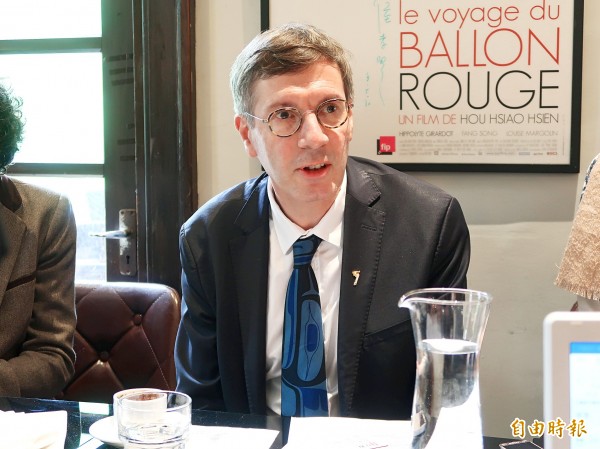《TAIPEI TIMES》 Testing needed in fake news battle: French diplomat

French Ambassador-at-large for Human Rights Francois Croquette attends a tea gathering with the media in Taipei yesterday in which he praised Taiwan’s efforts in pushing for the legalization of same-sex marriage. Photo: Lu Yin-hsuan, Taipei Times
By Sean Lin / Staff reporter
The comparison and testing of systems is required in legislative efforts to curb the spread of fake news, French Ambassador-at-large for Human Rights Francois Croquette said yesterday, as he underlined the importance of synergy between the government, media, civic groups and major Internet companies in the fight against disinformation.
Croquette last night attended La Nuit des Idees, or “the Night of Ideas,” at Taiwan Contemporary Culture Lab in Taipei, where he led a discussion on human rights education in the digital age themed: “Facing waves of digital transformation.”
The early days of the digital era brought the hope that it would usher in a golden age for human rights, Croquette told reporters in an interview, citing the Arab Spring.
However, that initial hope has in the past few years evaporated as authoritarian regimes and non-governmental actors have attempted to undermine democratic values and freedoms through the spread of disinformation and breaches of Internet users’ privacy, he said.
Disinformation is a global problem and has been used in France to instigate violent protests and to influence elections, as evidenced by attacks against French President Emmanuel Macron following the theft of data ahead of the 2017 French presidential election, he added.
Asked whether freedom of speech should be guaranteed even for rumormongers who spread fake news and are determined to destabilize society, Croquette said that if new legislation is introduced, it must achieve the right balance between freedom of speech and penalties.
France has introduced a law aimed at limiting disinformation by making its dissemination more difficult, but when it comes to imposing penalties, laws have always been in place, he said, citing punishments for French media outlets that do not fact-check their news.
Another example is when people abuse their freedom of speech and spread “hate speech” — for example, by denying the Holocaust or other historical crimes, he added.
France has not had a chance to test how well the new law works ahead of elections, Croquette said, adding that it would be good to compare different laws implemented by several nations to “see what works and what does not.”
Ultimately, the nation’s judges would have to decide whether any new regulation to deter disinformation respects the existing legal framework and is in line with people’s basic rights, he said.
However, laws alone are not enough to effectively combat disinformation, which would require the collaborative efforts of reporters, non-governmental organizations and Internet giants to invent a new form of governance of the digital world, he added.
For instance, Google France has engaged in dialogue with French officials about what might exacerbate the spread of disinformation, while Facebook has entered into an agreement with the French government to clearly label “paid-for” content and let users decide whether to view it, which would be helpful when elections come around, Croquette said.
Regarding the drive to legalize same-sex marriage, Croquette expressed optimism that bills proposed for the cause would be passed into law, by which time Taiwan would signal to the world that it is at the forefront of the promotion of human rights.
When France in 2013 passed legislation to legalize same-sex unions amid great controversy, some French-speaking Canadians had anticipated that in five years public sentiment on the issue would be very different, he said.
Now, there is no conceivable way that same-sex marriage could be abolished in France, even if a new ruling party is elected, despite ongoing protests by conservative groups, he added.
“I am certain that some of the young people that are taken to the streets to demonstrate against same-sex marriage might have a different view when they are old enough to form their own judgement,” Croquette said.
While marriage is defined by the French civil code, the legislation of same-sex unions was a “new law” at the time of its introduction, he said, adding that there had not been a debate similar to the one in Taiwan over whether a special law or an amendment to the Civil Code should be adopted when legalizing same-sex marriage.
The law made it unequivocal to same-sex couples that they would enjoy the same rights as any other couple, he said.
Asked about ways to allow more Taiwanese to realize that marriage is a basic right, Croquette said that education — which is itself a basic right — is the key.
Taiwan needs to have teachers trained in the education of human rights, in addition to curricula designed to teach academic subjects, he said.
新聞來源:TAIPEI TIMES
%http://www.taipeitimes.com/














